1
HOME > Tips & Advice >
MEN'S WEDDING BAND MATERIALS: PROS AND CONS
Written by Menswear Style in Tips & Advice on the 28th July 2023
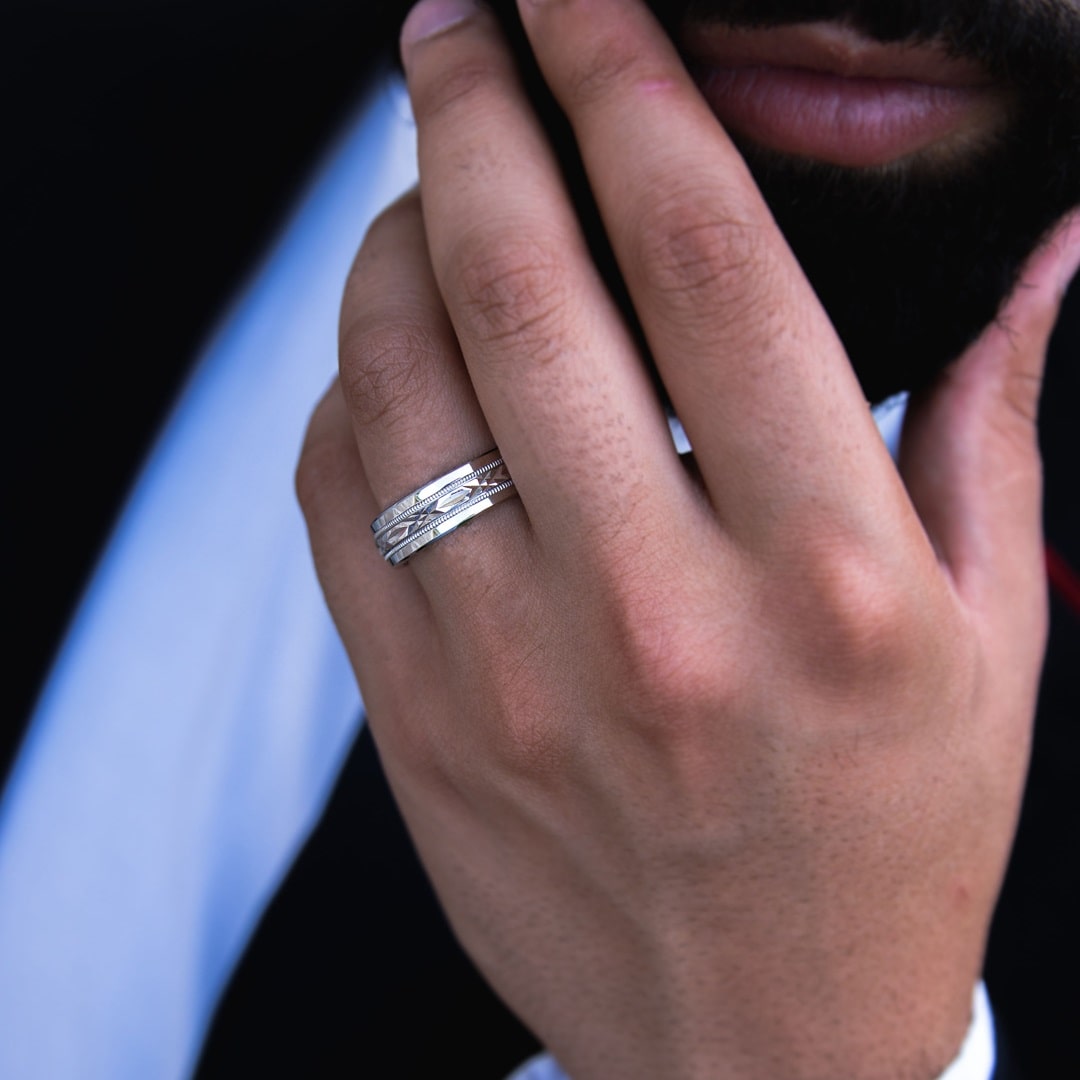
Finding the ideal wedding band is a big decision because it represents your partner and your relationship's permanent connection. Understanding the benefits and constraints of each material can help you choose the best men's wedding band among the many that are available. The abundance of options, which range from pricey precious metals to durable alternatives, might be intimidating. In this article, we'll examine the advantages and disadvantages of various wedding ring materials so you can make an educated choice based on cost, style, durability, and upkeep requirements. We'll give you a thorough review to help you choose the ideal ring that reflects your individual taste, whether you're drawn to the elegance of palladium, the toughness of tungsten carbide, or the adaptability of stainless steel.
Tungsten Pros
- Tungsten is the most scratch-resistant.
- It is highly durable and retains its original appearance for a long while.
- When compared to precious metals, tungsten wedding bands are typically more affordable.
- Tungsten rings are simple to remove in the event of an emergency because they don't require cutting or sawing.
- Tungsten is not likely to trigger allergic responses as it is hypoallergic.
Tungsten Cons
- It is not as pure white as platinum by nature: The natural hue of tungsten is a bluish-grey, which may not suit those who prefer a bright white metal.
- Tungsten rings are not flexible and cannot bend because of their extreme hardness. Under extreme pressure, they are vulnerable to breaking.
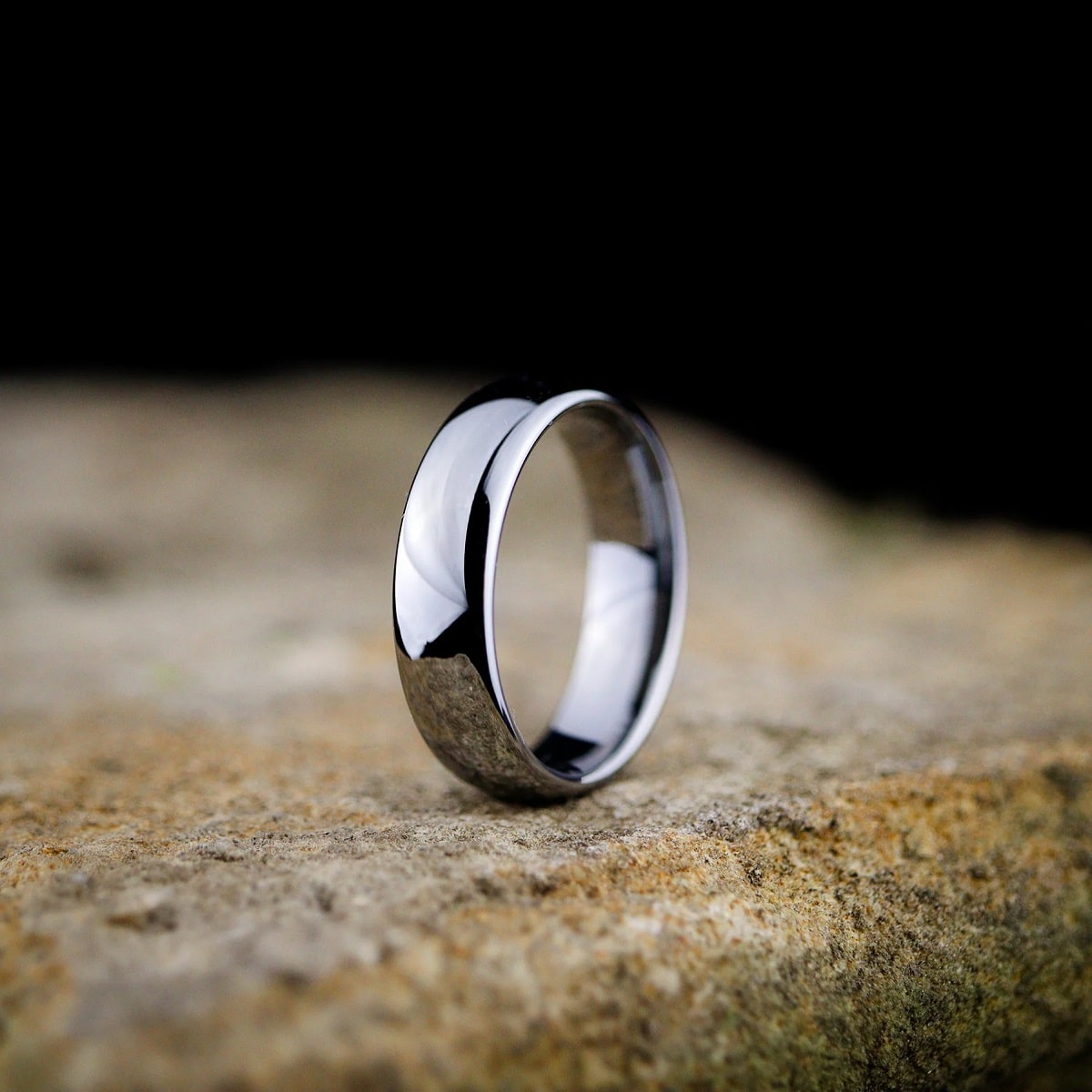
Tungsten Carbide Pros
- Tungsten Carbide is one of the hardest materials used to make jewellery, which makes it extremely resistant to dents and scratches.
- Tungsten carbide has a long-lasting lustre and requires little upkeep to keep its polished appearance.
- Sturdy and fashionable wedding mens bands made of tungsten carbide are available at a fair price.
- Tungsten carbide is hypoallergenic and acceptable for people who have a metal allergy.
Tungsten Carbide Cons
- Although tungsten carbide is extremely scratch-resistant, if it is subjected to sufficient force or impact, it may be vulnerable to breaking.
- Due to the hardness of tungsten carbide rings, it is essential to confirm the exact sizing before purchasing.
- Tungsten carbide ring resizing is difficult, and many jewellers do not offer the service.
Ceramic Pros
- Wedding rings made of ceramic have exceptional scratch resistance, assuring their longevity for a very long time.
- Black ceramic rings retain their black colour, unlike black tungsten rings, which can scratch off.
- Since ceramic does not set off metal detectors, it is practical for travel or particular work settings.
- Ceramic is hypoallergenic and excellent for people who are sensitive to metals.
Ceramic Cons
- Ceramic rings, like tungsten, are not flexible and can fracture if given enough force.
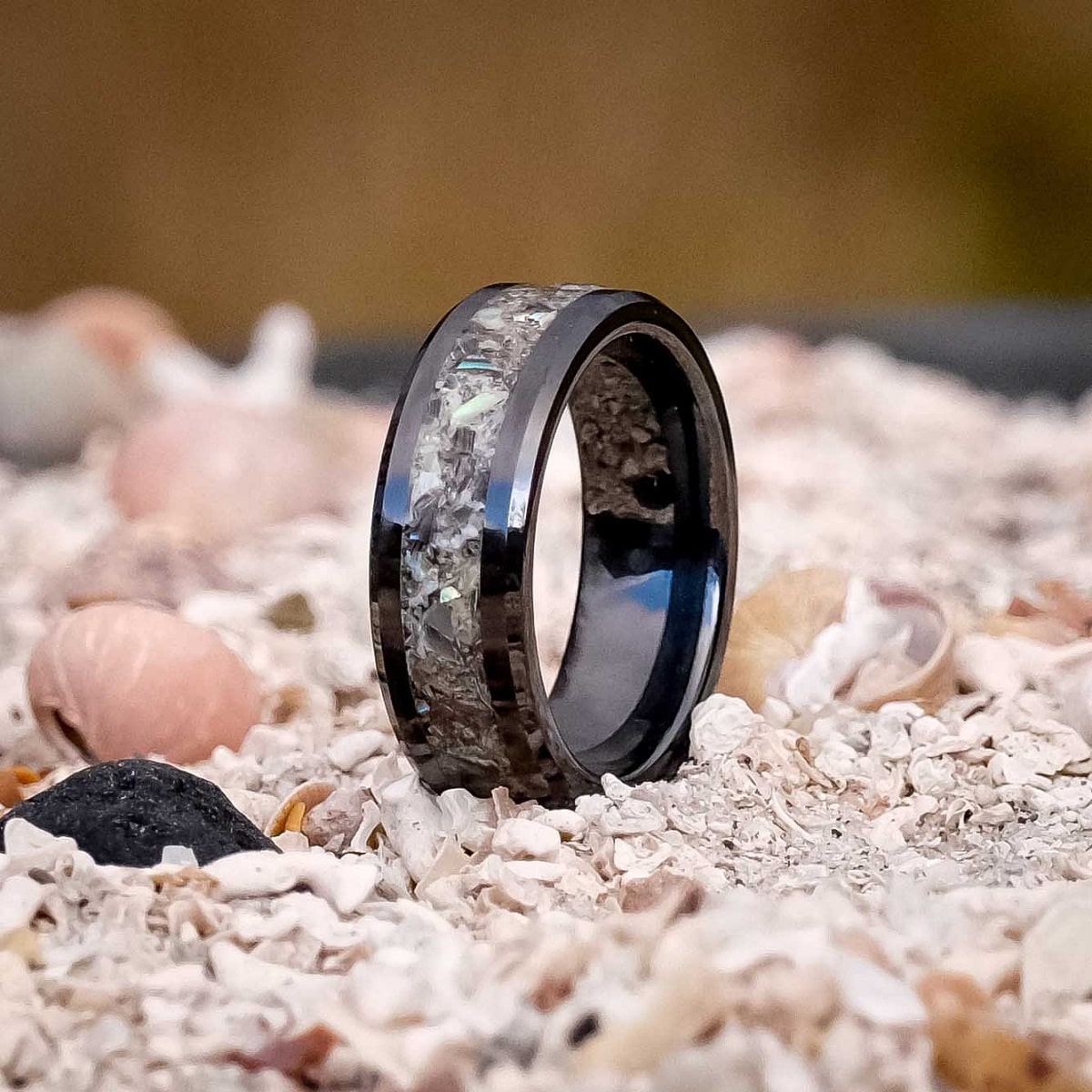
Cobalt Chrome Pros
- Cobalt chrome looks platinum in appearance without needing to be plated. So it is an affordable option for anyone who wants a Platinum ring but can not afford it.
- Compared to titanium, cobalt chrome offers better scratch resistance.
- It is well-accepted by most people because it is hypoallergenic.
- Cobalt chromium alloy has a high resistance to cracking and can endure pressure without breaking.
Cobalt Chrome Cons
- Cobalt chrome is less resilient than tungsten, although being more scratch-resistant than certain other metals.
- Cobalt chrome rings must be sawed off in the event of an emergency.
Titanium Pros
- Titanium is very biocompatible and hypoallergenic, making it a great material for anyone with a metal allergy.
- Titanium is capable of withstanding high pressure without cracking.
- Titanium wedding rings are a less expensive option compared to costly metals.
Titanium Cons
- Titanium is not as white as platinum; it has a deeper shade than platinum, which may not be to everyone's taste.
- Titanium rings must be cut in an emergency.
- Scratches are more likely to occur on titanium than on other alternative metal rings.
Tantalum Pros
- Tantalum is as malleable as gold, which makes resizing rings simpler while maintaining the ring's integrity.
- Tantalum is not likely to trigger allergic reactions in people.
Tantalum Cons
- Tantalum has a deep grey appearance that is almost black, which may not be the preferred choice for everyone.
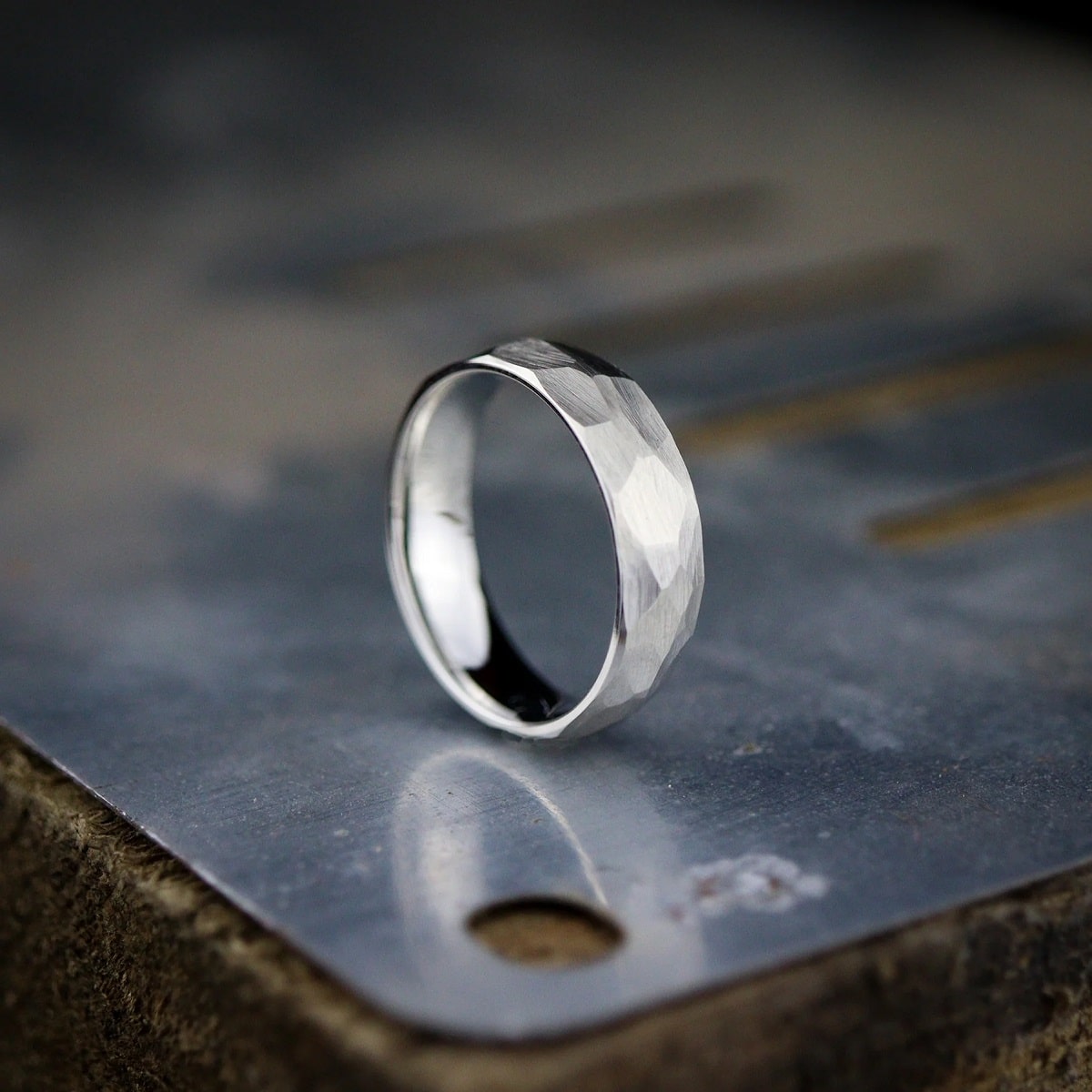
Palladium Pros
- Palladium has a bright white aspect similar to that of platinum, giving it an elegant and refined appearance.
- People who are sensitive to metals usually tolerate it well since it is hypoallergenic.
- Palladium is much lighter than platinum, making it a more comfortable fit.
- Palladium is a strong metal that doesn't tarnish or discolour and resists corrosion.
- Palladium has good resilience to everyday wear and tear even though it is not as scratch-resistant as tungsten or ceramic.
Palladium Cons
- Since palladium is a valuable metal, its cost may be higher than that of other metal substitutes.
- Palladium may naturally patinate over time, necessitating periodic polishing to maintain its original sheen. Occasional maintenance is required.
- There are limited design options available compared to gold or platinum.
Stainless Steel Pros
- Compared to precious metals or alternative metals like tungsten or palladium, stainless steel rings are typically more affordable.
- Stainless steel is ideal for daily wear since it is very resistant to tarnish, corrosion, and scratches.
- Stainless steel is hypoallergenic and generally well-tolerated by people.
- Stainless steel is readily cleaned with soap and water, requiring little upkeep.
Stainless Steel Cons
- Stainless steel rings are typically heavier than other alternative metals, which may be a factor of personal preference.
- In comparison to rings made of expensive metals like gold or platinum, stainless steel rings have less intricate design options.
- Rings made of stainless steel, like those made of tungsten carbide, cannot be easily resized, therefore accurate sizing is important.
Platinum Pros
- Platinum is a very prestigious metal known for its exclusivity and elegance.
- Platinum retains its magnificent white hue, which appeals to people looking for a brilliant metal.
- It is good for those who are hypoallergenic.
Platinum Cons
- Platinum is one of the priciest metals, making it a high-end option.
- Even though it is highly durable, it is not as scratch resistant as palladium.
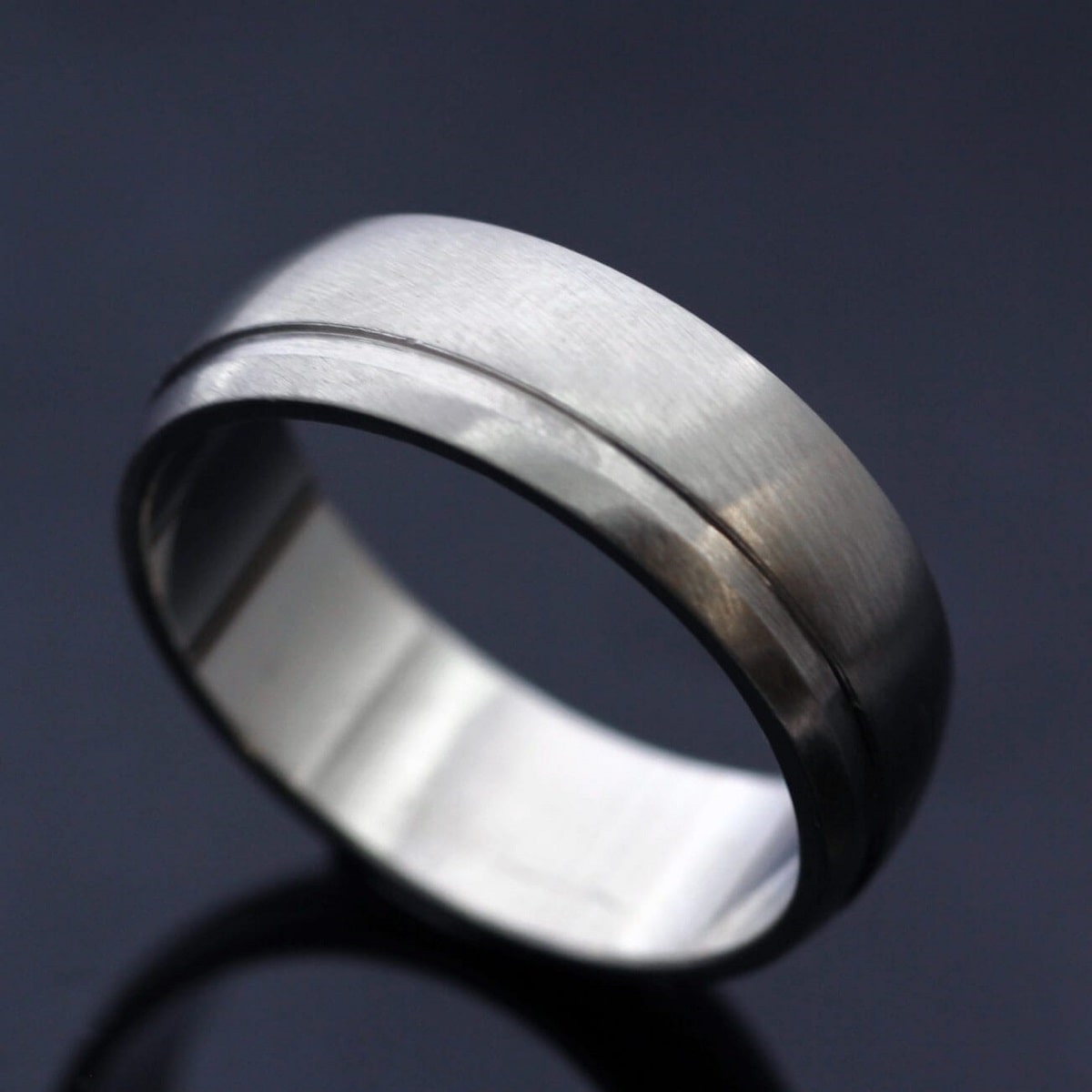
Silver Pros
- Silver is the least expensive precious metal.
- Silver gives off a traditional white metal appearance in the hue white.
- It is hypoallergenic.
- Silver is more scratch-resistant than gold.
Silver Cons
- Silver is susceptible to tarnishing over time. But routine cleaning might help keep its lustre.
- Silver has a moderate scratch resistance; but, with time, wear can still be seen.
Gold Pros
- Gold is regarded as a dependable investment and a good store of value because it keeps its value well over time.
- Gold is available in different colours including yellow, white, and rose gold.
- Pure gold is hypoallergenic.
Gold Cons
- Gold is a somewhat soft metal that is prone to scratches with continued use.
- Compared to other metals, gold often costs more.
Conclusion
There are several options to take into consideration when it comes to the composition of men's wedding bands, each with a unique set of benefits and drawbacks. In the end, the choice of material for a men's wedding band depends on aesthetic preferences, financial constraints, lifestyle, and personal taste. Think about things like price, maintenance requirements, hypoallergenic qualities, scratch resistance, and durability. It is advisable to get advice from a respected jeweller who can help you choose the perfect wedding ring material for your particular requirements and tastes. You may choose a wedding band that not only represents your commitment but also matches your style and endures the test of time by giving it serious thought.
Trending
2
3
4
5
6
7
8
9
10









